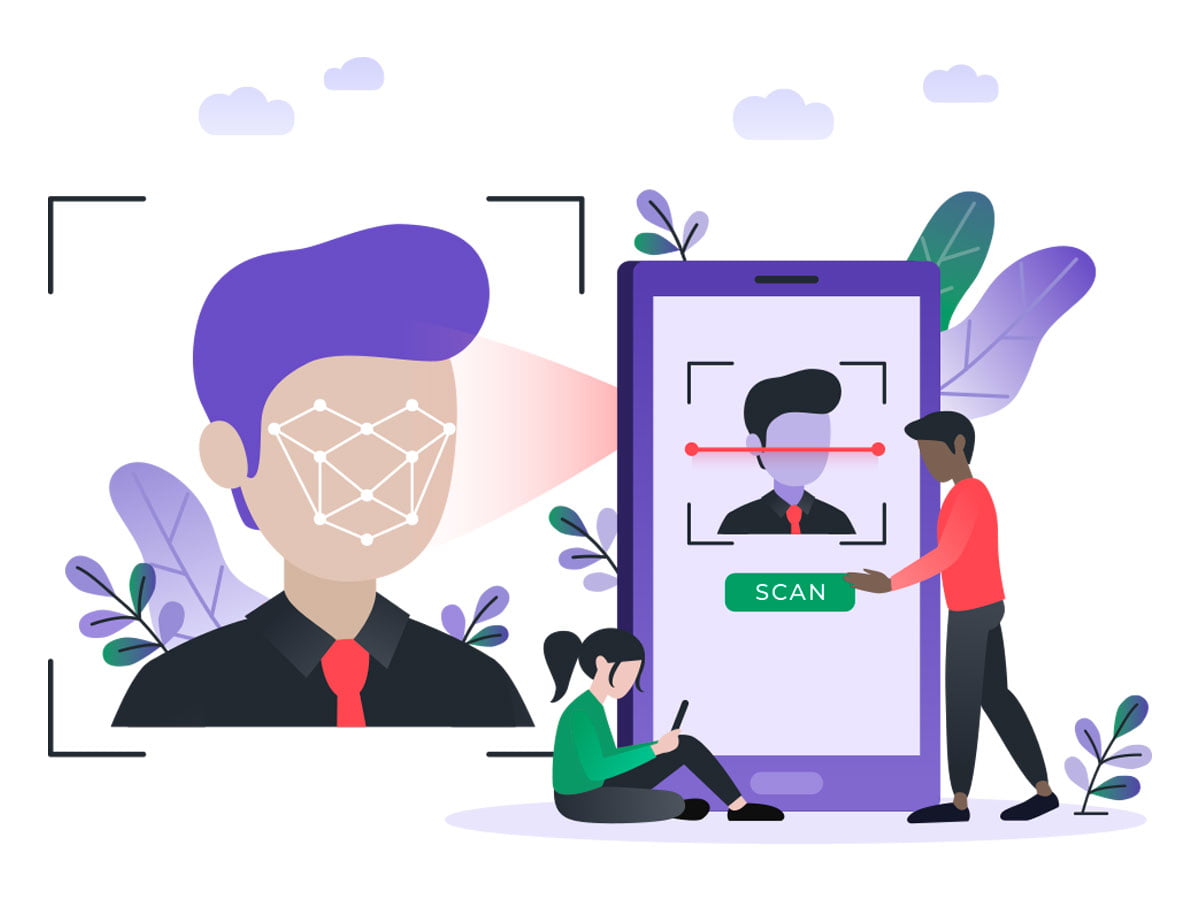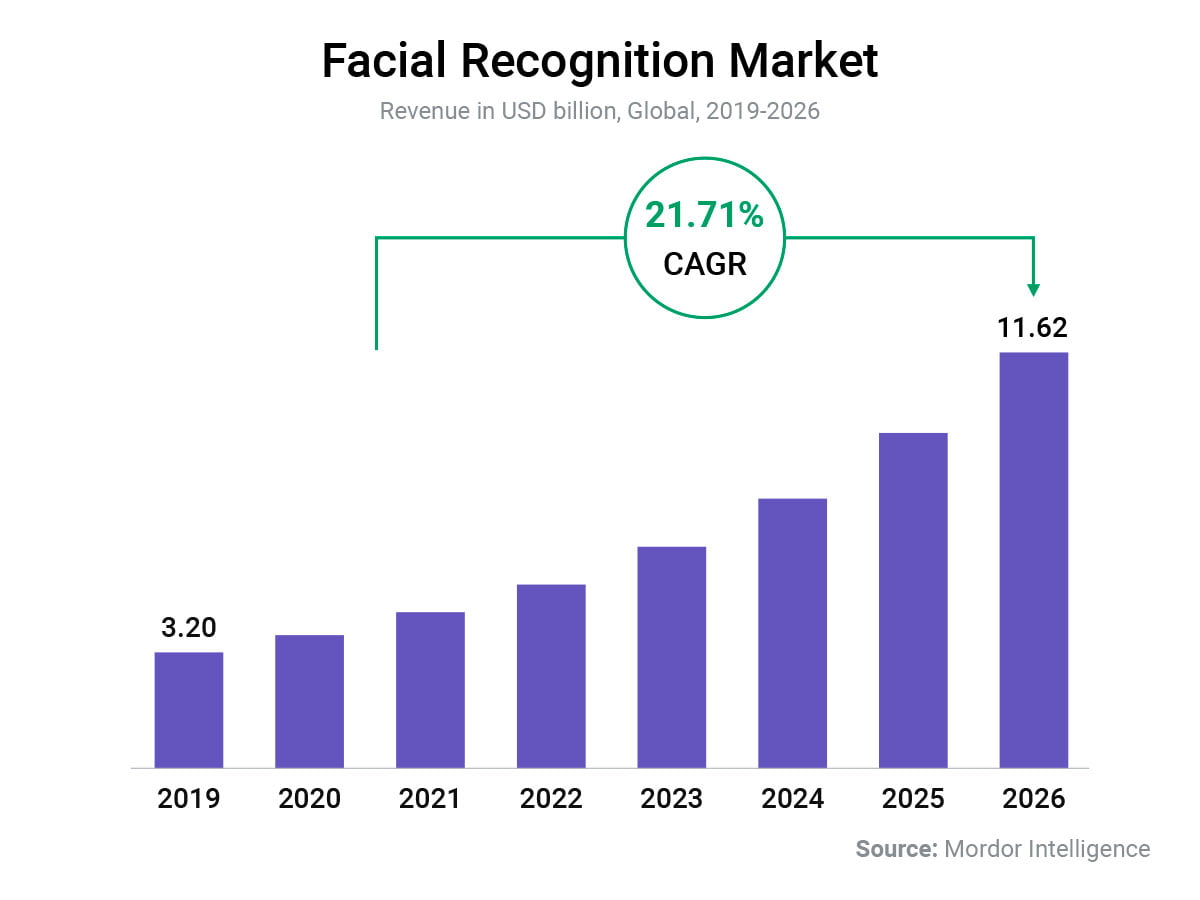Updated: 8/30/2023
Facial recognition is a technology that has received a lot of attention in recent years. Today, people are using this technology to unlock devices, verify payments, pay for purchases, and go through border control. Today, sports fans can use Apple's Face ID to log into the NBA App and use their face for concessions purchases or as tickets to sports events.
The key question is: what potential does facial recognition hold for the event industry? Could it replace QR codes, ID checks, or other security measures?
In this article, we provide our expert considerations on these questions and explain the most important aspects of facial recognition. We will outline the benefits of this technology and how event professionals can leverage facial recognition to increase the security of their events.
How Does Facial Analysis Function?
Facial recognition uses biometric software capable of uniquely identifying people using images and videos. The technology used for this process is not new, but recently it has become more accessible on smartphones, tablets, and computers.
Based on a person’s facial contours, this software can identify, recognize, and authenticate a person using 2D and 3D facial images. All faces are matched based on their visual geometry, including features like eyebrows, eyes, nose, and mouth to create a “facial fingerprint.”
Each analysis produces object notation numbers for the image and when patrons enter the event, the software compares data from the source image to each of the images in its database. The faces are assigned with a similarity score and the face that has the highest similarities is a potential match.

Use of Facial Recognition in Sports
Facial recognition's first use case in sports was for security. Police would use it to spot criminals who were getting into sports events and make sure they were removed from the venues. Today, facial recognition can be used to enter the venue, purchase tickets, order food, or merch, and engage fans.
One of the recent examples is Qatar. City streets and stadiums in Doha were equipped with special face recognition cameras for the 2022 World Cup in Qatar to ensure the safety of thousands of football fans and players.
Stadium Access and Operations
For example, The Mets have decided to use facial recognition technology for staff at all entry points to their Citi Field stadium and administrative buildings. This way, the team made sure that all their players were safe from the fans, and they could move around the venue and open all the doors with their faces. 
Enhancing Fan Experience
Facial recognition can also be a powerful tool to engage audiences through fan engagement applications. Fans can use a mobile app that helps them take selfies during the game and then upload them on in-stadium jumbotrons or game broadcasts. This way, fans can support their team while making new memories with friends and family.
Player Performance
Finally, facial recognition is slowly finding its way towards performance analysis used by every player and athlete. New systems like the Noah system saw fast adoption across the NBA as it helps identify players as they get to practice and tracks their shots to provide useful data they can later analyze with team coaches.
Benefits of Facial ID
Facial recognition for events started as a way for patrons to have easier access to venues. From an event organizer’s perspective, this technology boosts event security with a hassle-free check-in process and ensures that only people with invitations can enter the venue. Below are some of the potential benefits of using facial ID for various types of events.
1. Faster and simpler check-in process
Printed tickets are slowly becoming a thing of the past. Smartphones can store tickets in digital wallets that have QR codes, iBeacons, or RFID. These technologies are making the check-in process much faster than before and improving the overall event experience. But for high-traffic events with thousands of people waiting in line, facial recognition software can decrease the waiting time if patrons have their image uploaded in the system.
2. Improved event security
Facial recognition increases event security and can spot potential threats. For example, it has the potential to work against spoofing, presentation attacks, and other types of disruptions. Facial recognition software can spot deep fakes, lookalikes, and wax figures that problematic patrons might use for their uploaded photos and will not allow them to proceed without a valid ticket purchase.
3. Easier session tracking
Facial recognition can be an effective way to record who attends each session when there are multiple event options. It can easily scan everyone who entered each session and send data straight to the cloud. This technology requires a minimal setup and allows for organizers to analyze the success of their event.
4. Less pressure on event staff
Biometric checks significantly speed up the verification process and reduce the number of invalid scans. This technology is very useful for corporate planners, exhibition organizers and conference companies, as it allows staff to focus on other aspects of the event while participants can enter the venue securely.

Facial Recognition During an Event
One of the reasons why ticketing platforms are starting to use facial recognition is to ban unsafe concertgoers from entering the venue. We have included the most crucial reasons to have facial recognition at your next event:
-
Access control for authorized staff
For events with special security concerns, facial recognition software is used for specific sections where access is restricted to staff only. If someone without access tries to sneak in, the system will trigger an alarm and help security find the intruder.
One of the most famous baseball teams, the Mets, decided to deploy facial authentication technology in the 2022 season to improve security in key areas, such as their clubhouses and front offices.
-
ID checks
The ID-checking process can be very tedious and time-consuming for staff at venues. The process is simplified by having patrons submit their photos when purchasing a ticket and allowing the platform to scan their faces when they enter the venue. The process is streamlined, and long queues can become a thing of the past.
-
Locating missing persons
At big sports events and concerts, people can easily find themselves far away from their friends or family. In massive crowds, it's easy to get separated from your child or a friend and cameras can help to quickly locate someone lost while security can bring them back.
-
Data gathering for event optimization
At events with multiple sessions or separate stages, like conferences or music festivals, event planners could use facial recognition to have the ability to track attendees to survey which sessions were most attended. Using this information, they can analyze the success of their event and their patrons’ interests to improve their agendas for future events.
The Impact of COVID-19 on Facial Recognition
While the awareness of facial recognition has risen in the event industry, the COVID-19 epidemic posed some challenges for the technology. People around the world began to wear masks, and many experts saw this as a major challenge for facial recognition technology.
All of a sudden, software designed to analyze faces was less accurate since half of the face was covered with a mask. However, developers have been testing face detection algorithms to become more accurate, even when a person is wearing a mask.
Final word
People are becoming increasingly comfortable with ID checks when they are related to banking, unlocking devices, and identity confirmation at work. However, when it comes to the ticketing industry, it may take a little getting used to for patrons.
Here at Softjourn, we are always ready to have a lively, informative discussion about the influence of new technologies. We will gladly analyze your company’s needs and offer our consulting services. Our ticketing experts are devoted to finding the best solution that will benefit our clients and their patrons.










